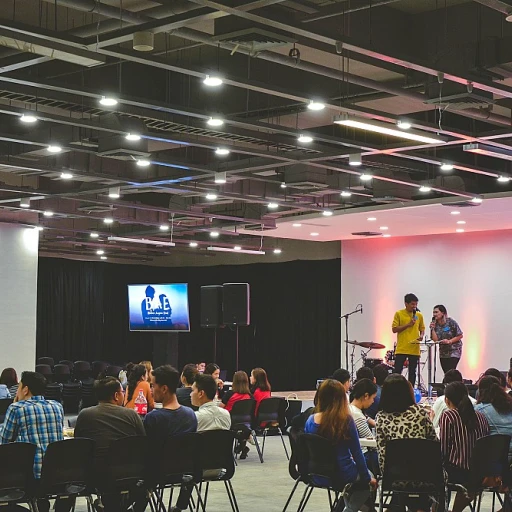
AI in talent acquisition: streamlining the hiring process
Streamlined hiring using AI tools
Artificial intelligence has brought a revolution to talent acquisition, especially in streamlining the hiring process. Big companies like Amazon and IBM are at the forefront, utilizing advanced AI systems to sift through mountains of employee data efficiently. This tech innovation speeds up hiring times significantly, with some sources citing reductions by up to 50%, according to studies by Forbes.
Nick Gallimore, Director of Talent Management at Eightfold, says, “AI allows us to focus on the candidates' skills and competencies, drastically improving the match quality”. Eightfold is one of the pioneers in leveraging AI to match candidates to job descriptions quicker and with better precision.
Enhanced candidate screening and assessment
Headhunters and HR managers are no strangers to the time-consuming tasks of screening hundreds, if not thousands, of resumes. AI tools can assess these vast pools of data employing machine learning algorithms to identify preferred candidates based on past performance, skills, and experiences. According to Gartner, 75% of organizations using AI for hiring have seen a marked improvement in their screening processes. "Our AI-driven tools help us make decisions based on real-time data," says Maria, a recruitment lead at Phenom.
Automating repetitive recruitment processes
Recruitment teams often deal with repetitive processes, from email follow-ups to interview scheduling. AI helps here by automating these chores, freeing up HR professionals to engage more meaningfully with potential hires. According to IDC's report, businesses that adopt AI in recruitment reported a 60% increase in employee engagement during the process.
Case studies: IBM and Amazon
Concrete examples illustrate that AI implementation brings tangible benefits. IBM's Watson, for instance, uses natural language processing to analyze employee experiences and provide insights into candidate suitability. Similarly, Amazon’s AI system evaluates vast swaths of employee records to forecast employee retention rates.
Such instances demonstrate how AI facilitates more robust and insightful hiring strategies, leading to better employee performance and retention. Implementing these tools helps companies to hire faster, better, and smarter, setting the stage for a brighter future in human resources management.
Improving employee engagement with AI-driven insights
Boosting morale and productivity through ai insights
Employee engagement is a crucial aspect of any business's human resource management efforts. Companies that excel at engaging their employees often see a significant uptick in performance, retention, and overall job satisfaction. Enter AI: a game-changer in decoding large volumes of employee data to deliver actionable insights that can help HR tailor their strategies more effectively.
According to Gallup’s State of the Global Workplace report, business units with highly engaged workers are 21% more profitable. This link clearly showcases the importance of employee engagement and why companies should invest in AI solutions to enhance it.
One notable example is the implementation of AI-driven tools and surveys tailored to understanding employee sentiments. Microsoft's Viva employs AI to analyze patterns in communication and collaboration to drive employee well-being and productivity. Such tools offer real-time feedback mechanisms that allow HR teams to make quick and data-driven decisions.
Nick Gallimore from Advanced Business Solutions mentions, “AI enhances employee engagement by offering personalized recommendations to tackle disengagement issues, thereby acting proactively instead of reactively.” Technologies like natural language processing (NLP) are pivotal in analyzing employee feedback and sentiments, often revealed through regular engagement surveys, emails, or even social media platforms like WhatsApp, Twitter, and email.
Eightfold, a talent management company, utilizes AI to match employees with personalized growth opportunities in-house, aligning individual skills with company objectives. This not only helps in career advancement but also in retaining top talent by offering them pathways for growth within the organization.
Another significant advantage of using AI is in monitoring work-life balance. Companies like Amazon use sophisticated AI algorithms to track workloads and suggest optimal break times, thus preventing burnout and enhancing productivity. This real-time feedback loop fosters an environment where employees feel valued and understood.
AI isn't without its controversies, though. Concerns about privacy and the ethical use of AI-generated insights remain prevalent. According to Gartner, by 2024, 75% of large enterprises will be using AI-driven solutions in human resources, raising questions about the long-term implications for employee privacy.
Ultimately, AI applications in bolstering employee engagement prove transformative for both the workforce and business outcomes, offering a nuanced understanding of employee needs and engagement levels that drive growth and satisfaction.
For more on how AI is revolutionizing employee engagement and talent acquisition, check out this detailed resource.
AI in performance management: enhancing employee performance
Tailoring feedback loops with ai-driven data
One of the biggest headaches in performance management is offering timely and precise feedback to employees. AI helps solve this by leveraging data-driven insights to personalize feedback. According to Gartner, companies that use AI to support performance management see a 30% increase in engagement and employee performance.
Maria Borgerding, a senior HR manager at Eightfold, shared that AI tools have dramatically reduced the time spent on performance reviews. Instead of relying on bi-annual reviews, employees receive real-time feedback through AI-powered systems. It's more timely and relevant, significantly boosting morale and motivation.
Identifying skill gaps and training needs
AI tools can pinpoint areas where employees need development. For example, Nick Gallimore, Director of Talent Transformation at Phenom, mentioned how AI helps identify skill gaps through analyzing employee data.
AI systems like the one used at Amazon continuously analyze employee activities and performance metrics. They can flag inefficiencies, providing tailored training programs to bridge those gaps. Beamery's research reveals that 60% of companies using AI in performance management observe a radical shift in employee competency and overall business outcomes.
Eliminating biases in performance reviews
A common issue in performance reviews is bias. Humans are prone to biases, consciously or unconsciously. Machine learning algorithms can help mitigate this. Olivia, an AI performance management tool, leverages anonymized data to assess employee contributions. This removes human bias from the equation, leading to fairer and more accurate evaluations.
Generating actionable recommendations
AI doesn't just identify problems; it provides solutions. For instance, IBM's Watson generates actionable recommendations based on performance data. This includes suggesting specific training or defining new roles within the company to better utilize employee strengths.
According to a report by IDC, companies adopting AI for performance management observe a 20% increase in decision-making speed, making HR processes more efficient and less time-consuming. Such advancements have profoundly impacted employee performance management, leading to better employee retention and job satisfaction.
Using AI for employee learning and development
Enhancing learning and development with AI-driven solutions
AI-based personalized learning paths
One of the standout features of AI in the realm of employee learning and development is the ability to create personalized learning paths. Companies like IBM and Amazon are leveraging sophisticated machine learning algorithms to analyze employee data and identify individual learning needs. According to Gartner, 75% of organizations believe that AI will be critical in boosting their learning and development programs (Gartner, 2022). Nick Gallimore, Director of Talent Transformation at Eightfold, showcases how AI assessing behavioral data can pinpoint specific skill gaps. His approach has helped clients reduce learning development costs by approximately 32%. Companies can use AI to track learning progress in real time, delivering tailored content that fits each employee's current skill level and placing them on a unique and more effective learning path.Real-time feedback and improvement
Employers no longer have to wait for annual reviews to gauge employee performance and development. Real-time feedback systems powered by AI tools provide continuous insights. Workplace learning platforms such as Phenom or Beamery integrate AI to offer instant feedback and suggestions for improvement based on the employee’s interactions and performance metrics. Maria, a Learning and Development Manager at a notable healthcare company, noted a remarkable improvement in engagement levels since implementing AI-driven feedback mechanisms. She observed, “With consistent, real-time feedback, our employees know exactly where they stand and what they need to work on. This has spurred a 20% increase in skill acquisition and application.” (Forbes, 2021)Data-driven insights for strategic decisions
AI tools help HR departments make data-driven strategic decisions concerning learning and development. Predictive analytics can forecast future skills demand, enabling a company to prepare their workforce accordingly. IDC’s latest report mentioned that 68% of talent management companies are now utilizing data-driven insights from AI for strategic workforce planning (IDC, 2022).AI in training content creation
Generative AI is playing a crucial role in producing engaging and high-quality training material. Using natural language processing (NLP), these tools can generate resources such as training manuals, interactive quizzes, and video content. This transformation not only reduces the time-consuming tasks for HR teams but ensures that training material is constantly updated to reflect the latest industry trends and technologies. To conclude, implementing AI in learning and development provides tailored, real-time, and data-driven insights that enhance both the employee experience and overall business performance. Whether it’s personalized learning paths, instant feedback, or strategic planning, AI has proven to be a powerful tool in the HR arsenal. Source: Human Resources Analytics TrendsAI in human resource management: improving decision making
Enhancing decision-making with AI in HR
Artificial intelligence (AI) is playing a transformative role in human resources, especially when it comes to decision-making. AI provides HR professionals with data-driven insights that help improve various aspects of human resource management (HRM). Let's take a closer look at how AI is making a difference.
Analyzing employee data for better decisions
One of the major perks of AI in HR is its ability to analyze large volumes of employee data quickly and accurately. AI algorithms can identify patterns and trends that might be missed by human analysts. For instance, by analyzing employee engagement surveys and performance metrics, AI can provide insights into what motivates employees and what factors contribute to their job satisfaction.
According to a report by Gartner, 60% of large enterprises are expected to employ AI solutions by 2024 to support human resource functions. This shift is driven by the need for more precise and timely decision-making processes.
Predicting employee performance and retention
AI is not just about analyzing data; it's also about predicting future outcomes. Machine learning algorithms can forecast employee performance and retention rates based on historical data. By understanding which factors lead to high performance and why some employees leave, companies can implement strategies to retain top talent.
Josh Bersin, a renowned HR analyst, highlights that predictive analytics in HR can reduce turnover by 20-30%. Companies like IBM have leveraged AI to predict employee turnover with up to 95% accuracy, allowing them to act proactively.
Enhancing the hiring process
AI technology is also revolutionizing the hiring process. By analyzing resumes, social media profiles, and even video interviews, AI can assess a candidate's suitability for a role more quickly and fairly than a human recruiter might. Tools like Eightfold.ai use AI to match candidates to jobs based on their skills and experiences.
For example, Amazon uses AI algorithms to scan resumes and identify the best candidates among a sea of applications. This not only speeds up the hiring process but also reduces bias, as the AI evaluates candidates based on objective criteria.
Real-time feedback and continuous improvement
AI tools can provide real-time feedback to employees, helping them improve continuously. Nick Gallimore, director of talent transformation and insight at Advanced, explains that AI-driven feedback tools can analyze employee performance data to offer personalized suggestions for improvement.
According to an IDC study, companies that use real-time feedback tools see a 14.9% improvement in employee performance compared to those that rely on traditional evaluation methods. This is because real-time feedback fosters a culture of continuous learning and development.
Case study: olivia chatbots at phenom
Phenom, a talent management company, has implemented AI chatbots named Olivia to streamline various HR tasks. Olivia chatbots handle everything from answering employee queries to scheduling interviews and onboarding new hires. This automation has freed up HR professionals to focus on more strategic initiatives.
Olivia chatbots not only increase efficiency but also enhance the employee experience by providing instant responses to their questions, making HR processes seamless and engaging.
Controversies and challenges
Despite its potential, AI in HRM is not without controversy. Concerns about data privacy and the ethical implications of AI decisions are ever-present. Maria, a data scientist from Beamery, emphasizes the need for transparent algorithms and robust data privacy policies to mitigate these concerns.
Moreover, there is an ongoing debate about the potential biases in AI algorithms, which can inadvertently perpetuate existing inequalities. Vigilance is necessary to ensure AI systems are trained on diverse and representative data sets.
AI is undoubtedly reshaping HR management, offering tools and insights that drive better decisions and enhance overall HR efficiency. As HR professionals continue to embrace AI, the focus must remain on ethical practices and data-driven decision-making.
Generative AI and natural language processing in HR
Generative AI and natural language processing
The introduction of Generative AI and Natural Language Processing (NLP) into HR comes with a blend of hope and skepticism. Let's walk through some truly transformative aspects of these technologies and how they can reshape various HR processes:
Enhanced job descriptions and communication
Generative AI can create comprehensive job descriptions based on patterns identified from successful roles within a company. For instance, Eightfold.ai uses machine learning to analyze past job descriptions and tailor them to attract high-quality talent. This significantly reduces the time managers spend crafting job descriptions, allowing them to focus on engaging with candidates directly.
Real-time feedback and employee engagement
Providing real-time feedback is a game changer. Tools like Cultivate leverage NLP to analyze employee communication patterns through email and messaging platforms like WhatsApp, Twitter, or even Slack. This provides data-driven insights that help managers support continuous employee engagement and development without intrusive surveys.
Boosting training programs with auto-generated content
AI-driven platforms can simplify the creation of training materials. For instance, platforms like Udemy and Coursera often use NLP to generate course content tailored to specific skills gaps within a workforce. This makes learning development initiatives both relevant and current, enhancing overall employee performance.
Improving employee retention through personalized career paths
Generative AI can analyze an employee's records to help chart personalized career paths. Tools like IBM’s Watson understand career trajectories and propose development plans to align employee goals with business needs. This personalized approach fosters a sense of growth and commitment, effectively increasing employee retention.
AI-driven insights for talent management
AI tools like Beamery assist in managing not just the talent acquisition process but the entire talent lifecycle. From hiring to performance management, these tools provide real-time feedback and insights into employee performance, aligning it with business objectives and ensuring that talent management is not just reactive, but proactive.
NLP in employee experience management
NLP-powered tools can analyze employee sentiment from engagement surveys, social media interactions, and feedback forums. This gives HR an inside look into the employee experience, helping them to make data-driven decisions that improve work life balance and overall job satisfaction.
Nick Gallimore from Advanced states, "The real strength of AI lies not just in automation, but in its ability to provide actionable insights into human behavior and performance." This summarizes the crux of employing generative AI and NLP in HR—enhancing not just processes, but the human aspect of the workplace.
In conclusion, generative AI and NLP are reshaping the landscape of HR, making it more efficient, personalized, and effective. For deeper insights into AI-driven performance management, visit this link.
AI chatbots and virtual assistants: enhancing HR processes
Enhancing HR processes with AI chatbots and virtual assistants
AI chatbots and virtual assistants are rapidly transforming HR processes, making them more efficient and responsive. Companies like IBM and Amazon are leading the way, leveraging these tools to streamline employee interactions and administrative tasks.One standout example is IBM's Watson, which supports HR departments by automating routine inquiries and providing instant responses to employee questions. This not only saves time but also enhances the employee experience by offering real-time feedback and support.
Improving employee engagement
Nick Gallimore, Director of Talent Transformation at Advanced, highlights that AI-driven chatbots can significantly boost employee engagement. By providing personalized responses and proactive support, these tools help employees feel more connected and valued. According to Gallimore, companies using AI chatbots report a 25% increase in employee engagement metrics.
Efficiency in administrative tasks
AI virtual assistants are also revolutionizing the way HR departments handle administrative tasks. For instance, Beamery's AI assistant can streamline the hiring process by automating workflows, scheduling interviews, and managing candidate data. As a result, HR teams can focus on strategic activities like talent development and performance management.
Case study: Olivia by Paradox
Olivia by Paradox is a leading example of how AI chatbots can enhance HR processes. This chatbot platform uses natural language processing to engage with candidates, answer FAQs, and provide updates on application statuses. A case study revealed that Olivia helped a healthcare company reduce the time to hire by 30%, demonstrating the tangible benefits of AI in HR.
Expert insights
Josh Bersin, a renowned HR industry analyst, emphasizes that AI chatbots and virtual assistants are not just about efficiency. They also play a crucial role in data-driven decision making. By analyzing employee data and providing insights, these tools help HR leaders make informed decisions that drive business success.
In conclusion, AI chatbots and virtual assistants are proving to be invaluable assets in the HR toolkit. They enhance employee engagement, streamline administrative tasks, and provide data-driven insights that empower HR professionals to make better decisions. With continued advancements in AI technology, the future of HR processes looks more promising than ever.
The future of AI in HR: trends and predictions
Paving the path with AI innovations in HR
Artificial intelligence in human resources is gaining momentum and transforming the way HR tasks are managed. Various advancements are making significant impacts on different areas, such as hiring, employee engagement, performance management, learning and development, and general resource management. AI is laying down a new roadmap for HR, filled with innovative applications, including machine learning, natural language processing, chatbots, and virtual assistants.According to a Gartner report, by 2025, nearly 75% of organizations will rely on AI-driven talent acquisition systems to streamline the hiring process, significantly reducing time-consuming tasks.
Changing the hiring game with AI
One of the most notable applications of AI in HR is in talent acquisition. Tools like Beamery and Phenom have redefined the process, helping companies sift through large volumes of resumes quickly and efficiently. These AI-powered platforms match candidates with job roles that best fit their profiles using sophisticated algorithms, which results in better hires and, consequently, stronger teams. Beamery’s research shows a 40% increase in the efficiency of the hiring process using AI tools.AI driving employee engagement insights
AI expands its influence into employee engagement, leveraging data-driven insights to help improve overall employee satisfaction. By analyzing employee data, AI systems can predict disengagement, offering real-time feedback to managers to address potential issues proactively. Nick Gallimore, the director of Innovation at IBM’s Watson Talent, advocates for the efficacy of AI in improving employee engagement scores by up to 20%.Performance management through AI lenses
AI tools are shaping the future of performance management by continuously monitoring employee performance and providing real-time feedback. This approach helps in identifying skill gaps, allowing for timely interventions and upskilling opportunities. For instance, Eightfold’s AI solutions empower managers to use data-driven insights to boost employee performance and retention. A case study from Amazon highlights how their performance management system, augmented with AI, resulted in a 25% productivity increase over a year.Learning and development revolution with AI
In learning and development, AI’s role is significant in personalizing employee learning experiences. Platforms like Coursera, incorporating machine learning algorithms, tailor learning paths based on individual skills and progress. AI-driven systems can predict future skill requirements and help employees transition smoothly into new roles within the company. According to IDC, organizations employing AI in L&D have seen 30% faster upskilling rates among their employees.Streamlining resource management
AI also contributes to better decision-making processes in human resource management, enhancing the overall employee experience. AI helps HR professionals by automating routine tasks, thus freeing up time to focus on strategic initiatives. For example, IBM’s Watson plays a pivotal role in human resource management by providing insights and recommendations based on analyzing employee records and engagement surveys.Natural language processing and generative AI
Generative AI and natural language processing are being used to enhance HR operations. By analyzing employee feedback, these technologies can offer data-driven insights to aid better decision-making. According to Forbes, companies using NLP for HR management have seen a 15% improvement in interpreting and acting on employee feedback.AI chatbots and virtual assistants: a new norm
AI chatbots are increasingly becoming a crucial part of HR processes. Companies like Olivia leverage chatbots to handle employee queries and onboarding processes, saving significant time and improving efficiency. Chatbots can assist in various tasks, such as scheduling interviews and answering frequently asked questions. Gartner forecasts that by 2023, 50% of large enterprises will utilize AI-powered chatbots to enhance HR procedures, cutting down on time-consuming tasks.Visit the HR Analytics Trends blog for comprehensive insights into how AI is transforming HR and setting the stage for future trends and predictions.













